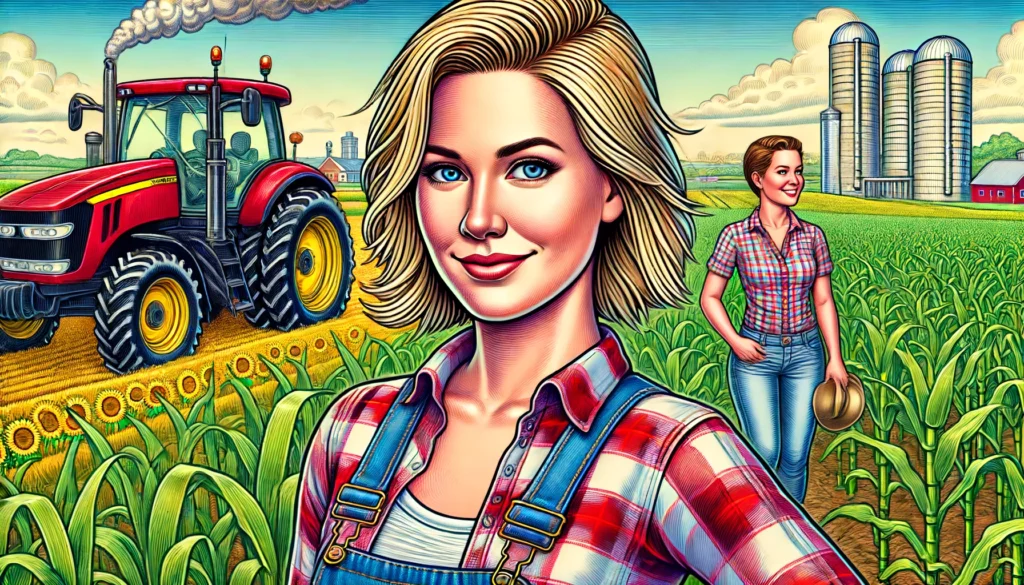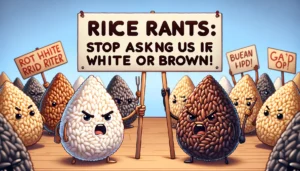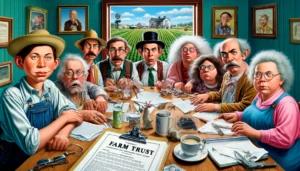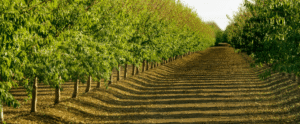
Farmer Cowboy A detailed and vivid illustration of Julie Ziegelhaus a 21 year old blonde Iowa farm girl. Julie is standing in a field with a tractor in the backgro.webp.webp
Julie Ziegelhaus: The Witty Iowa Farmer Taking on Climate Change with a Smile and a Tractor
In the rolling fields of Iowa, where the corn grows tall and the soybeans sway in the breeze, one farmer is taking a unique approach to tackling climate change. Julie Ziegelhaus, a witty and sharp-tongued agriculturalist, has become an unexpected voice in the battle against nitrous oxide emissions. With her characteristic humor and candid observations, she’s shedding light on the serious issues facing modern agriculture, while drawing parallels to the struggles faced by farmers worldwide.
Laughing Gas in the Atmosphere: The Ultimate Cosmic Joke
“Who would have thought nitrous oxide, the same stuff that makes you laugh at the dentist, would be causing climate change?” Julie quips, leaning against her tractor. “Great, now even the atmosphere is laughing at us farmers.” Indeed, nitrous oxide (N2O) is no joke when it comes to its impact on the environment. According to scientists, it’s 300 times more potent than carbon dioxide in trapping heat. Julie’s take? “If only my crops grew that fast!”
The Green Revolution’s Ironic Twist
Back in the early 20th century, the development of nitrogen fertilizer was hailed as a game-changer. It boosted crop yields and fed millions. But fast forward to today, and we’re seeing the unintended consequences of all that fertilizer use. “We saved the world from hunger with fertilizers, and now those same fertilizers are turning the world into a greenhouse,” Julie says, shaking her head. “Classic farm plot twist.”
Global Connections: Ethiopian Farmers’ Struggles
Julie isn’t just focused on her own fields. She’s aware of the global implications of climate change, especially for farmers in countries like Ethiopia. “Ethiopian farmers rely on rainfall to make a living and are adversely affected by extreme weather events and changing weather patterns,” she notes. “Female farmers’ low access to education, credit, and technology makes them more exposed to the negative impacts of climate extremes.”
Government Gadgets and High-Tech Hopes
The USDA is banking on precision agriculture technology to save the day. They envision sensors that can detect the perfect amount of fertilizer needed for each plant. Julie, however, remains skeptical. “The USDA thinks sensors will save us. I’m just waiting for them to send me one that doubles as a remote for my TV,” she jokes. “It would be nice to catch up on my shows while I’m out in the field.”
The Fertilizer Fiasco: Teenagers and Mall Money
One of the biggest problems with nitrogen fertilizer is that most of it doesn’t get used by the plants. Instead, it escapes into the atmosphere or flows into waterways, causing a host of environmental issues. “Most of the fertilizer doesn’t even get used by the plants,” Julie explains. “It’s like giving a teenager money for books and watching it disappear at the mall. You just never know where it’s going to end up.”

BP Bunge’s Bacteria Revolution: Yogurt for Corn?
In Brazil, BP Bunge Bioenergia is cutting fertilizer use in half by using bacteria to help plants take up nitrogen more efficiently. “BP Bunge is cutting fertilizer use with bacteria,” Julie marvels. “Next, they’ll have us using yogurt to grow corn. Who knew the future of farming was in our fridge’s veggie drawer?”
Nitrous Oxide: The Silent Supervillain
While everyone was focused on carbon dioxide, nitrous oxide was quietly plotting its takeover. “It’s like the villain in a bad superhero movie,” Julie observes. “Just when you think you’ve got one problem licked, another one pops up.”
Environmental Problems: Fish on Vacation
Excess nitrogen in the environment doesn’t just contribute to climate change; it also causes harmful algae blooms and dead zones in rivers and lakes. “The excess nitrogen causes algae blooms and dead zones in rivers,” Julie says with a wry smile. “I guess the fish needed a vacation spot too. Who can blame them?”
Precision Ag Tech: Waiting for a Bus in Nowhere
Precision agriculture promises to revolutionize farming by providing detailed data on soil health and crop needs. But the reality? “Precision ag tech promises a revolution, but so far it’s like waiting for a bus in the middle of nowhere – it’s coming, just don’t know when,” Julie remarks. “I’m still waiting.”
Party Balloons to Climate Crisis: Clowns Beware
Who would have guessed that party balloons could be linked to a climate crisis? “Next thing you know, birthday clowns will be the new environmental enemy,” Julie laughs. “Imagine the headlines: ‘Clowns Cause Climate Catastrophe!’”

Farmers and Netflix: High-Tech Dreams
There’s a hope that farmers will embrace new sensors and technology to improve efficiency. Julie’s more down-to-earth view? “They think we’ll use these new sensors to help with farming. I just want to stream Netflix while I’m on the tractor. Is that too much to ask?”
Government Playing Catch-Up: Grandpa on Snapchat
The government’s response to nitrous oxide emissions has been sluggish at best. “The government’s trying to play catch-up with nitrous oxide,” Julie says. “It’s like watching my grandpa try to figure out Snapchat. It’s not pretty.”
Win-Win with Bacteria: Future in the Fridge
BP Bunge’s approach to using bacteria instead of fertilizers is showing promise. “Who knew the future of farming was in our fridge’s veggie drawer?” Julie marvels. “Maybe we should start raiding our kitchens for farming solutions.”
Over-Fertilization: Soil Love
Critics say farmers are over-fertilizing their crops. Julie’s take? “They say we’re over-fertilizing. I say we’re just giving the soil a little extra love. Who doesn’t need a bit of extra care now and then?”
Future Superheroes: Overalls to the Rescue
If solving climate change were as simple as cutting back on fertilizers, farmers would be the superheroes of the modern era. “If solving climate change was as simple as cutting back on fertilizers, we’d all be superheroes in overalls by now,” Julie quips. “But hey, I’m ready to don the cape if it means a healthier planet.”
Learning from Ethiopia: Adapting and Innovating
Julie is inspired by efforts in Ethiopia, where small changes to traditional farming practices are helping farmers adapt to climate change. “Farm Africa is doing amazing work with the Union of Ethiopian Women Charitable Associations (UEWCA),” she says. “They’re helping people adapt and mitigate against climate change through climate-smart agriculture training sessions, introducing drought-tolerant seeds, and setting up irrigation systems. It’s a great example of how small changes can make a big difference.”
Building Awareness and Empowerment
Julie also highlights the importance of raising awareness and empowering communities. “Farm Africa’s project will raise 450,000 people’s awareness of climate change through local media campaigns, workshops, and women’s discussion groups. It’s inspiring to see women becoming champions for climate action.”
Conclusion: A Smile and a Challenge
Julie Ziegelhaus isn’t just a farmer; she’s a reminder that humor can be a powerful tool in addressing serious issues. As she navigates the challenges of modern agriculture with wit and wisdom, Julie represents the resilience and innovation of farmers everywhere. With each joke and observation, she’s not just making us laugh—she’s challenging us to think differently about the way we grow our food and care for our planet.

Disclaimer
The views and opinions (especially the outlandish ones) expressed in this article are the creation of Farmers and a cowboy. They do not necessarily reflect the views of The Evil Empire (Google) or its employees. Any resemblance to actual persons, cows, tractors, or birthday clowns is purely for the sake of amusement.
Originally Published at FarmerCowboy.com
2024-06-13 12:21:22
Originally posted 2024-06-15 15:54:25.
Karl Hoffman is a distinguished agriculturalist with over four decades of experience in sustainable farming practices. He holds a Ph.D. in Agronomy from Cornell University and has made significant contributions as a professor at Iowa State University. Hoffman’s groundbreaking research on integrated pest management and soil health has revolutionized modern agriculture. As a respected farm journalist, his column “Field Notes with Karl Hoffman” and his blog “The Modern Farmer” provide insightful, practical advice to a global audience. Hoffman’s work with the USDA and the United Nations FAO has enhanced food security worldwide. His awards include the USDA’s Distinguished Service Award and the World Food Prize, reflecting his profound impact on agriculture and sustainability.





Farm Radio’s country segments often feature songs that highlight the beauty of nature.